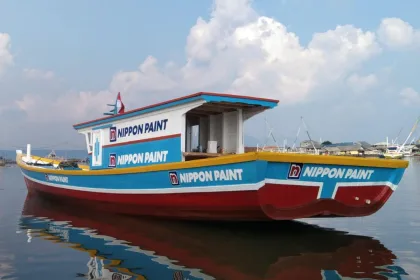In 2013, Myanmar’s President, Thein Sein signed into effect the Telecom Law, constituting one of the last true greenfield telecom opportunities in the world. As part of the country’s continuing effort to open up to the rest of the world through foreign investment opportunities, the new Law provided an exciting opportunity for telecommunications start-up Company, Apollo Towers.
WORLD-CLASS TOWER PROPOSITION
Founded in 2013 by telecom veteran, Sanjiv Ahuja – who is well regarded in the industry through his former position as Chief Executive Officer of Orange, in addition to his position as Chairman of Eaton Towers in Africa – Apollo Towers Myanmar was comprised of a number of experienced senior decision makers from the very beginning, demonstrating its broad understanding of the tower industry and exhibiting the entrepreneurial talents needed to operate in emerging markets.
Coupled with this high calibre senior experience came an equally impressive support structure in the form of major shareholder TPG, a US-based private equity firm which has around $70-80 billion assets under management globally.
“Apollo Towers sits within the TPG Growth Fund which focuses predominantly on Southeast Asia. And in July this year, we were pleased to announce Myanmar Investments Limited as a new shareholder; an AIM-listed private equity Company based here on the ground in Yangon,” comments Henry Butler, Corporate Finance Manager of Apollo Towers Myanmar.
Having now been in business for more than 18 months, the Company has the largest portfolio of towers among the four telecommunications companies in the country, having recently completed its first order for more than 1,000 for Norway’s Telenor. “We are now building a second order for 700 towers for the same client, with the aim of completing these by the end of this year,” Butler says.
Additionally, Apollo Towers also provide services for the two other telecommunications operators in the country, Ooredoo and KSGM (MPT), hosting them on existing sites as co-locators.
“In spite of two very long monsoon seasons, a nascent regulatory environment, and having to train as we go in a country whose working population had no prior experience of building towers, we are proud to have got to where we are today; investing a huge amount of time and money into the tower infrastructure required in Myanmar. I am confident that we are well placed to keep building telecom infrastructure here for years to come,” the Company’s Managing Director, Philippe Luxcey adds.
VALUE-ADD
Since establishing two years ago, Apollo Towers has strongly believed in its world-class tower proposition and all the accompanying services required in order to sustain its integrated tower offering; something which only one other of the four tower companies in Myanmar offers.
“We believed then, as we do now, that the provision of power is a key selling point for emerging market tower companies. By providing power in addition to towers, network operators are able to offload the added difficulty of upholding a network, allowing them to focus on market penetration. This view has been upheld as we now establish ourselves as the leading tower Company here in Myanmar for the long-term,” explains Butler.
Today, not only does Apollo Towers provide the highest quality towers, but the Company also maintains 99.9 percent network uptime, in line with Western performance standards. “In spite of extremely unreliable grid quality, this achievement has only been possible thanks to a strong experienced management team, efficient processes and long days of hard work,” Luxcey adds.
LEAPFROG TECHNOLOGIES
Although Myanmar shares some of the same characteristics and many of the same challenges that would be expected from an Asian frontier market, the country is also set apart from its Southeast Asian neighbours in a number of ways, including through the rapid pace of technological evolution.
Butler highlights: “Myanmar has skipped many of the stages of the technology revolution that we have witnessed in other Southeast Asian countries; consider the fact that Telenor started by providing both 2G and 3G upon entering the market, but are now setting up 3G equipment for example. This is because the demand for data is vastly higher than anyone anticipated and the market is being driven by the reducing cost of smartphones and the large young population in the country.”
With the uptake of 3G showing no signs of slowing down, the industry requires a strong backbone of tower infrastructure to facilitate this demand. “This means more towers and showcases the great potential in Myanmar. More than 5,000 towers have already been built here and this is only just the beginning. It is the operator’s aim to build up to around 18,000 towers in the next three years to achieve the target of 95 percent coverage, so there is still a great deal of investment to come,” Luxcey further details.
WORKING IN TANDEM
Drawing on the similarities between emerging economies, Apollo Towers’ team was bolstered with experience and training from four reputable giants known in both regions; namely Leadcom, Camusat, GTL and iEngineering.
“All of these companies have significant experience operating and building in emerging markets in Africa and Asia, as well as Eastern Europe, so for them Myanmar was just a new country and was not an exceptional challenge,” Butler emphasises.
“There was no tower building background in Myanmar like in Africa where you have contractors who move from one operator to another. Here the country was opening up so everything was new, which meant that all players were continuously learning and improving their processes. It was a big adjustment, but now it’s working well and we are already seeing more streamlined processes, particularly around site acquisition.”
Again pairing similarities with many African nations, and indeed the world, Apollo Towers places a concerted focus on employing Myanmar nationals; hiring a total of 111 permanent staff, of which 83 are local. “And we want this number to grow,” Luxcey adds. “Although we had to rely on expatriates to begin with, our goal now is to always hire a Myanmar local when we can, and to upskill our existing Myanmar employees to the levels you would see in any international company. Ultimately, the aim is to leave Apollo Towers in the hands of the Myanmar people.”
Moreover, by providing language lessons to any Myanmar staff that want to participate and supporting staff who want to take professional exams, amongst other things, Apollo Towers is able to retain most of its workforce for the long-term.
“It is worth noting that we are also attentive to social issues related to our activities and try and make a difference wherever we can. We believe our main contribution can come through the way we operate and the work that we provide to local communities,” explains Luxcey.
EMERGING A LEADER
With a long-term goal to be the leading and most reliable independent tower service provider in Myanmar already ringing true, Apollo Towers is now able to leverage its business model of providing integrated tower and power services in order to sustain and capitalise on the future tower infrastructure boom in the country.
Luxcey concludes: “In order to strengthen our leading position at the forefront of Myanmar’s tower industry, our goal is to aim for continuous improvement of our operations and ensure international best practice and standards are maintained to increase our advantage. This will involve moving into more rural areas, where we hope to pick up even more collocating tenants.
“We aim to provide the safest, strongest towers, and use the most efficient, cost effective, power equipment to keep the network going long into the future.”































